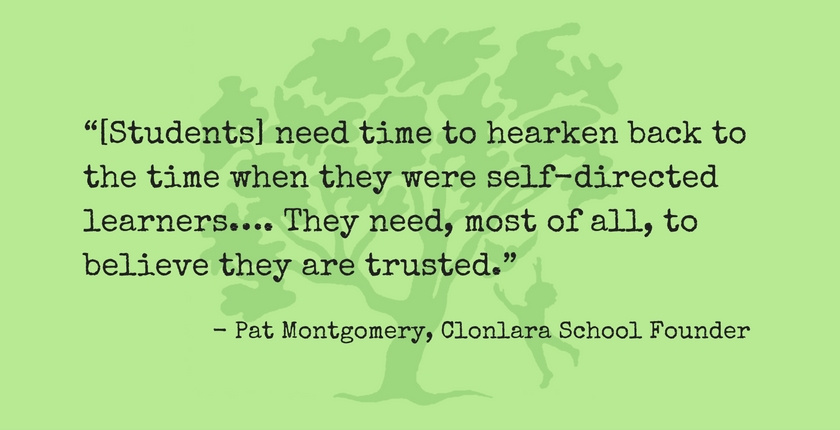By Pat Montgomery, Founder
Editor’s Note: From time to time, we’ll “look back” through our archives to share articles that are as relevant today as when they were printed. In this piece that was originally published in the Winter 2013 issue of The Learning Edge, Clonlara’s founder discusses the importance of deschooling time.
Switching from institutional schooling to home educating can be challenging for all parties concerned: parent, student, and other family members. I liken it in my own past experience to having an older student, say a teenager, enroll in Clonlara School after having spent years in conventional school. Chris comes immediately to mind.
He was 13 years old and had attended a private Christian academy since grade one, but he now refused to return, and his parents had had their fill of trying to work with the school. He spent the customary trial week at Clonlara and then signed on for the new school year. Our usual approach with new students was to let them experiences the various choices that all Clonlara students had—which class to attend, what activities to engage in, which teachers to communicate most with, etc. The maxim was, do as you choose as long as it is not harmful to yourself or another.
Chris spent most of the day in the treehouse with the younger kids. He helped them hammer together another level. One day I called to him from the path below. He reluctantly came down, and from his facial expression and his attitude it was clear to me that he thought I was going to censure him. His body language virtually screamed: I’m doing what I want and you can’t stop me.
“How are you doing, Chris?” I asked.
“You said we could make our own choices and I choose to do nothing,” he replied.
“Tell me what doing nothing looks like,” I said.
In time he realized that I was not questioning his choice, that I had meant what I said, and that I was really only checking in with him. We ended up laughing together. Years later, he told me that he just knew that I had come out to order him out of the treehouse and into classes. Then we laughed even harder!
Youngsters who have had confining experiences or who have been treated as though their opinions were not worth much, or perhaps were never even asked for an opinion, need time to relax. Ivan Illich called it deschooling. They need time to hearken back to the time when they were self-directed learners—up until they began attending school where adults are the ones who write the rules and determine the order of their days. They need, most of all, to believe they are trusted. They need adults who will talk TO them, not AT them. It takes time. It takes talking together, consulting.
But what if a youngster just sleeps or holes herself up in her room and doesn’t connect with her parent in the home school situation? Or one who watches TV or plays with today’s electronic thingamajigs?
Take deschooling time. Talk to them. Talk to them the way you talk to a friend who is 21 years of age or older. They will come to know that you are not passing judgment, that you are on their side, that together you can get through this period, that you are both members of the family, both wanting the best for them. Honestly.
Do you have any questions about deschooling or an experience to share? Please tell us in the comments below.








3 Responses
I have a 15 year old daughter who has been in private and then public school her whole school age life, and this is her first year home schooling. She is much more drawn to unschooling, and we’re all still in the process of understanding what that looks like. I am doing my best to trust her and her process, but as a product of traditional mainstream school, I’m also feeling deeply uneasy about the fact that she’s not engaged in learning any academic subjects at this time. She is very busy with a part time job at a used bookstore, evening community education classes, a high school girls’ film seminar series, and rock climbing, so she’s certainly not just sitting around the house. Are there any resources to help parents of high schoolers, and the young people themselves, to navigate the transition from mainstream school to deschooling to hopefully getting back into more academic pursuits so they can hopefully graduate?
Hi Kate,
Thanks for your comments. First let me say that your concerns are not uncommon. We have found that many students need time to unschool, as well as deschool, and find their own sense of who they are and their goals. This can be particularly frustrating for parents who struggle with the notion that their son or daughter are not learning anything and may never graduate from high school if they are left to their own devices, following their own curiosity. Our experience with students on both our Campus and Off-Campus Programs has shown that students need this time and freedom to explore their options. Your daughter is already exploring the world around her. She is being purposeful, she is engaged in learning, it just doesn’t look like what you are used to. You may find it helpful to have her document everything she is doing and learning. Keep a notebook or journal. Try and think about learning in a real world sense. What is she going to need to know to be successful? What skills or knowledge will she need? This can lead to areas of interest. What are her long term goals and how is she going to reach those goals? Maybe she doesn’t know yet and will need some time to process all of this. You do have time to allow her to follow this path. Trust her and trust the process.
Here are some resources that you may find helpful:
– Homeschooling and Unschooling Resources from John Holt
– The Teenage Liberation Handbook: This is an excellent insight into real teenagers who have decided to unschool.
– Unschool Rules: This is a great website from a family who are unschooling and they have links to other resources as well as subject links and ideas for unschoolers.
– Ted Talks Education Revolution: These are very short TED Talks that may spark deeper conversations between you and your daughter.
Let us know if we can help you in any way.
Dear Pat, Dear Kate,
Actually everubody rushes to success, whatever it means, and it is general nightmare to compare and be compared. And this is what our children should be free of, beyond the fact one cannot hardly evaluate how poor and harmful school existing life can be (or not, of course) for a person, for an angel. My children were all suffering lightening children at school, may it be more or less conventional, one cannot really perceive its masks, the imaginative modes to disguise emptiness to provide more pain.
My experience as a teacher is graceful understanding of how students get «back» to College four, five years after distress, psychiatric path and parents’ desillusion about what to do with their unsuccessful son or daughter to give evidence of outstanding mindfullness in Humanities. I am so impressed by their intelligence, their capacity to listen, their high level of mature intuition, their shining eyes coming from nowhere to heaven. I inexhaustibly love these «failed» youngsters thet get top marks for having lost time, lost family support, lost money, lost selfconfidence, lost love, lost themselves. Their worship was this entire loss to paradise regained. Trust these poor years of getting away from everything and love everyone this poor way mr. nobody deserves, just trust them and give them everything without asking how much they will pay you back for this sunny nothing a teacher, a mother can do for mankind.